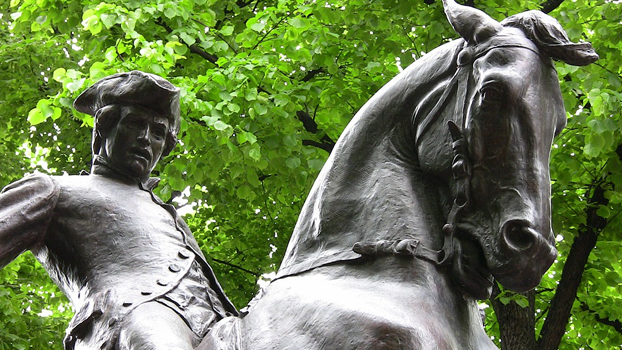Paul Revere Meetings
We've all heard of the famous American, Paul Revere, who warned that "the British were coming," but we rarely hear about the other man, William Dawes, who was sent out with the same message but whose name has faded from view. Why? According to some, Revere was enormously effective at finding the right people to notify. He banged on the doors of key influencers, while Dawes was less successful connecting with citizens who could alert local troops.
Using the example of Paul Revere, before I've made any major changes in my ministries, I've held "Paul Revere" meetings to give influential students the scoop on the changes that will be taking place in our group. Below are some things you want to keep in mind if you decide to hold a "Paul Revere" meeting:
As with all important meetings that you want to feel personal, I suggest you host this meeting away from church—in your home, if possible. Serve light refreshments.
A good number to invite is about 50% of your overall weekly attendance. Be sure to include several fringe students who may not currently be attending or who only visit sporadically.
Ask them to help use their influence to change the tenor of the youth gatherings and announce the change you are planning to make. Let them know that this change will not happen without their support.
I usually have a few student leaders share their own thoughts about the change, which I selected ahead of time because they each carried weight in different social circles.
Conclude the meeting by requesting that everyone fill out a response sheet before leaving. On the sheet, list any specific teams or projects you need help with, and ask the students to check off areas where they feel like they could get involved. Remember, what people are not up on, they're down on. To implement a major change successfully, it's important to win your students' hearts and then solidify your vision by enthusiastically enlisting them to take ownership.
We've all heard of the famous American, Paul Revere, who warned that "the British were coming," but we rarely hear about the other man, William Dawes, who was sent out with the same message but whose name has faded from view. Why? According to some, Revere was enormously effective at finding the right people to notify. He banged on the doors of key influencers, while Dawes was less successful connecting with citizens who could alert local troops.
Using the example of Paul Revere, before I've made any major changes in my ministries, I've held "Paul Revere" meetings to give influential students the scoop on the changes that will be taking place in our group. Below are some things you want to keep in mind if you decide to hold a "Paul Revere" meeting:
As with all important meetings that you want to feel personal, I suggest you host this meeting away from church—in your home, if possible. Serve light refreshments.
A good number to invite is about 50% of your overall weekly attendance. Be sure to include several fringe students who may not currently be attending or who only visit sporadically.
Ask them to help use their influence to change the tenor of the youth gatherings and announce the change you are planning to make. Let them know that this change will not happen without their support.
I usually have a few student leaders share their own thoughts about the change, which I selected ahead of time because they each carried weight in different social circles.
Conclude the meeting by requesting that everyone fill out a response sheet before leaving. On the sheet, list any specific teams or projects you need help with, and ask the students to check off areas where they feel like they could get involved. Remember, what people are not up on, they're down on. To implement a major change successfully, it's important to win your students' hearts and then solidify your vision by enthusiastically enlisting them to take ownership.
Related Items
I hear it all the time... "I just can't seem to grow my leadership team. I get people to volunteer and then they quit a little while in, or they won't even try." Everything rises and falls on leadership. We all know the expression; but the implications of it in youth ministry are huge. We all know that we don't have the hours in the day to do all the work it takes to run a youth ministry by yourself, have a life, and still make a significant impact in a few student's lives.
In this Youth Leader's Coach, "Key Hurdles In Growing Your Leadership Team," I unpack the six key hurdles you need to face if you want to multiply your leadership team. You'll smile during some sections of my honest mentoring dialogue and maybe even "ouch" during some of the others. Whatever the case, this Youth Leader's Coach will speak to a youth ministry topic we all deal with on a regular basis. And just for the record, if no one has quit your leadership team in the last couple of months, you're doing better than most.
Lovingly yours,

I recorded this Youth Leader's Coach quite some time ago, but I'm including it in the Playbook because it marked the beginning of an exciting new chapter in my ministry. We had just recently made the move to Sacramento, CA and I had accepted the role of "Director of Student Ministries." So even though I was over 50 at the time, once again, I started from "ground zero."
Charting the growth of a youth ministry from the beginnings can definitely be an overwhelming charge, however there are some simple concepts that can make the journey much easier and effective. As I started this new season, I paused to reflect on some basic, but essential, principles that I put into action in Sacramento.
Even if you're not starting out in a new youth ministry, you can still apply these concepts to your current youth ministry. All of them serve as guidelines to take any youth ministry to the next level. As you take this hour just to listen and reflect on these principles, may you be captured once more, by God's "heart" in reaching this generation of youth. We really do have the greatest "job" in the world!
Lovingly,

The majority of us have seen or channel surfed past "Flip That House" or a show like it. And, whether you're a HGTV/TLC fan or not, most of us in youth ministry have felt a similar need to "Flip That Youth Group." This need for a new and improved look may be in the area of outreach, worship, community, spiritual tenor or something entirely different. Regardless, whether now or later, we know the need for change is inevitable. Navigating that change can either be glorious if done well or catastrophic if not.
In this Youth Leader's Coach, we look at how to create specific change in our youth ministries without demolishing them. So, grab a cup of coffee and join me as we look at four things that will help us accomplish the task at hand one kid at a time.
Lovingly,

As I'm launching this exciting new chapter of my life, I just want to pause with you to share some essential principles that I'm putting into action here with my brand new youth ministry family. Statistics tell us if you're in youth ministry for the long haul, you will probably have at least one ministry transition. So whether you are starting all over again like me, or if you just want to bring fresh vision to the ministry you're at now, you'll get some great ideas from this message.
In this Youth Leader's Coach, "Thoughts From The Starting Line," I share with you ten key things that I'll be focusing on in my new youth ministry as I cast vision for the future. Remember, that "first impressions are lasting impressions" so I'm working hard to make these first few months with my new group of amazing students really count.
You may also want to listen to the Source that goes with this Youth Leader's Coach, "8,760 Hours From Now," the first night I spent with my students.
Starting with the end in mind,

In Cadre emails, I’m frequently asked to share some of my tips on developing a great leadership team. I thought you might enjoy hearing a few too. So that’s what I’m sharing in this ALLIANCE, “Mayo Beatitudes For Developing A Leadership Team.”
While some of the points may not sound too “glamorous,” please just know that they work if you have the work-ethic and endurance to keep doing them. So let’s take some time together dialoguing on 5 pragmatics to help you develop a phenomenal volunteer leadership team. I promise this topic, if applied, can be a game-changer. I’m excited for the conversation and ideas that this can spur among your group in the discussion time.






